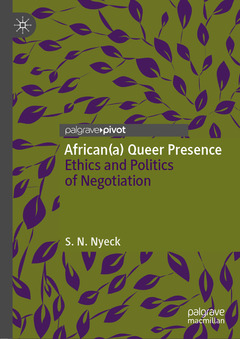Description
African(a) Queer Presence, 1st ed. 2021
Ethics and Politics of Negotiation
Author: Nyeck S.N.
Language: English
Subjects for African(a) Queer Presence:
Keywords
Queer politics; African queer politics; gender; sexual orientation; African government; Human rights; Discrimination; Queer agency; Political equality; African film; Proteus; Touki Bouki & Karmen Gel; Baudrillard's; Madame Brouette; Simulation and simulcra; Nego-Feminism; Game Theory; Identity Negotiation; African obscurentism; Queer enlightenment
132 p. · 14.8x21 cm · Hardback
Description
/li>Contents
/li>Biography
/li>Comment
/li>
To achieve something by way of negation is not just to state a difference. It is to impose a certain kind of violence and domination on things so ordered around for the sake of epistemic, religious, or political expediency also. The notion of queerness presented in this book takes the view that the process of conceptualizing selves ?out-of-order? is fundamentally anti-dialectical, negotiated, political and spiritual. Queerness negation manifested as a form of colonial and postcolonial epistemic and political violence defines reality as the clash of ideal and non-ideal categories. The demand to achieve something by way of negation that dialectics imposes on itself is costly because it treats negation as inevitable. From an anti-dialectical standpoint, analyses of the films Proteus and Karmen Geï deal with the processes of freeing queer selves from colonial and postcolonial negation. The book reflects on the conditions and possibilities of queerness affirmation as an ethics of presence grounded in the politics of negotiation following the proposition of nego-feminism and the practical humanism of Senghor to offer an ethical and embodied vision of an ecological depth of feeling and will as foundational to relational possibilities within the African(a) world.
S. N. Nyeck is visiting scholar at the Vulnerability and Human Condition Initiative at Emory University, Atlanta, USA and Research Associate with the Critical Studies in Higher Education Transformation, CriSHET at Mandela University, Port Elizabeth, South Africa.
Analyzes African queer identities and politics
Reviews Game Theory and Identity Negotiation
Offers a new approach to African politics
These books may interest you

Queerness in Play 36.91 €



